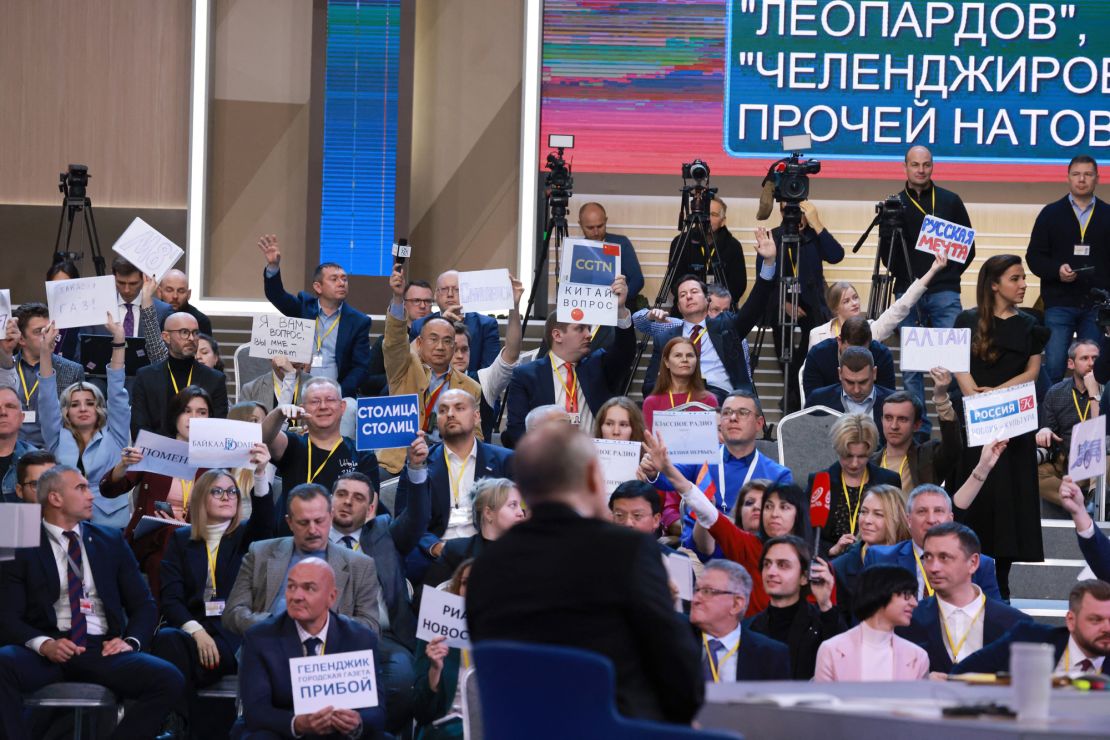Russian President Vladimir Putin has said that a dialogue over the detained Wall Street Journal reporter Evan Gershkovich is ongoing, but that it is “not easy,” as the White House continues to push for his release.
Putin said talks with the US are ongoing, and expressed hope for reaching a mutually acceptable solution, but insisted a solution “must suit the Russian side as well.”
Speaking during his first long-format press conference since the invasion of Ukraine, with Russian citizens also sending in questions, Putin said: “We have contacts with American partners on this matter. A dialogue is ongoing. It is not easy; I won’t go into details now, but overall, it seems to me that we are speaking a language understandable to each other.”
Gershkovich was arrested in March while on a reporting trip in the country. The FSB, Russia’s main security service, accused him of trying to obtain state secrets – a charge Gershkovich, his employer and the US government have strenuously denied.
If convicted, he faces up to 20 years in prison.
“I hope that we will find a solution. But I repeat that the American side must hear us and make a certain decision — one that suits the Russian side as well,” Putin added.
On Thursday, a Moscow court upheld a ruling that he must remain in detention until January 30. The initial ruling last month was criticized by the US Embassy in Moscow, which said it was “deeply concerned” by the decision.
Soon after his arrest, the US State Department officially declared Gershkovich wrongfully detained by Russia, stating: “Journalism is not a crime. We condemn the Kremlin’s continued repression of independent voices in Russia, and its ongoing war against the truth.”
But the Biden administration’s efforts to secure his release have not yet yielded results. The White House offered to trade a large number of Russian nationals detained on espionage charges abroad in exchange for the release of Gershkovich and fellow American Paul Whelan, two people familiar with the matter told CNN last week, but the offer was not accepted.
Asked about that rejection, Putin confirmed that discussions are underway regarding the possible extradition of the jailed Americans.

“It’s not that we refuse their return. We do not refuse. We want to negotiate, and the agreements must be mutually acceptable and satisfactory to both sides,” he said.
The ordeal for Gershkovich’s family is “painful” and “getting harder” as they await progress on his release, his sister Danielle told CNN last week.
“It’s now been almost or over eight months since he’s been imprisoned. And he’s missed out on so much. And we dearly miss him, but we have to stay strong and just keep fighting for Evan,” Danielle Gershkovich told Jim Sciutto on CNN Newsroom on Max.
Challenging questions go unanswered
As Putin was speaking, questions of a more challenging nature were at times flashed on big screens mounted behind Putin. These touched on sensitive topics such as the end of the Ukrainian war, surging prices, poverty and Putin’s personal wealth. None of these questions were verbally posed to Putin during the event in Moscow.
While Kremlin spokesperson Dmitry Peskov asserted on Wednesday that people were calling in to express support for Putin, the video questions aired during the conference were generally more neutral or complimentary. However, the screens in the backdrop at times featured more challenging and controversial queries throughout the session.
“When will Russians stop killing Russians?” one question on the screen popped up.
Another asked, “Mr. President, when will the real Russia not differ from television Russia?” Another delved into personal matters, inquiring about the number of yachts Putin owns. The question “Why do we have so many poor?” echoed concerns about economic disparities.
On Ukraine, Putin said the war would continue until the country accepts Moscow’s terms.
“There will be peace when we achieve our goals. They haven’t changed. This is the demilitarization and denazification of Ukraine and its neutral status,” he said, repeating his false pretext for his invasion of the country.
It is not unprecedented for Putin’s typically controlled phone-in sessions, held regularly since 2001, to display tough questions from Russian citizens. Previously, a few uncomfortable questions could be spotted on the screen during live broadcasts. During Putin’s phone-in line in 2019, questions about Russian opposition leader Alexey Navalny, poverty in the country, and Putin leaving his post popped up on the screens.
The Kremlin has a sophisticated messaging machine and Putin’s press conferences are tightly scripted. It is not clear whether they pre-approved all questions at Thursday’s event.
CNN’s Jim Sciutto, Natasha Bertrand, Katie Bo Lillis and Jennifer Hansler contributed reporting



